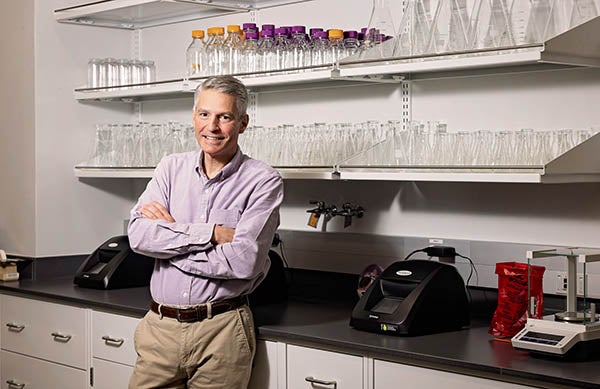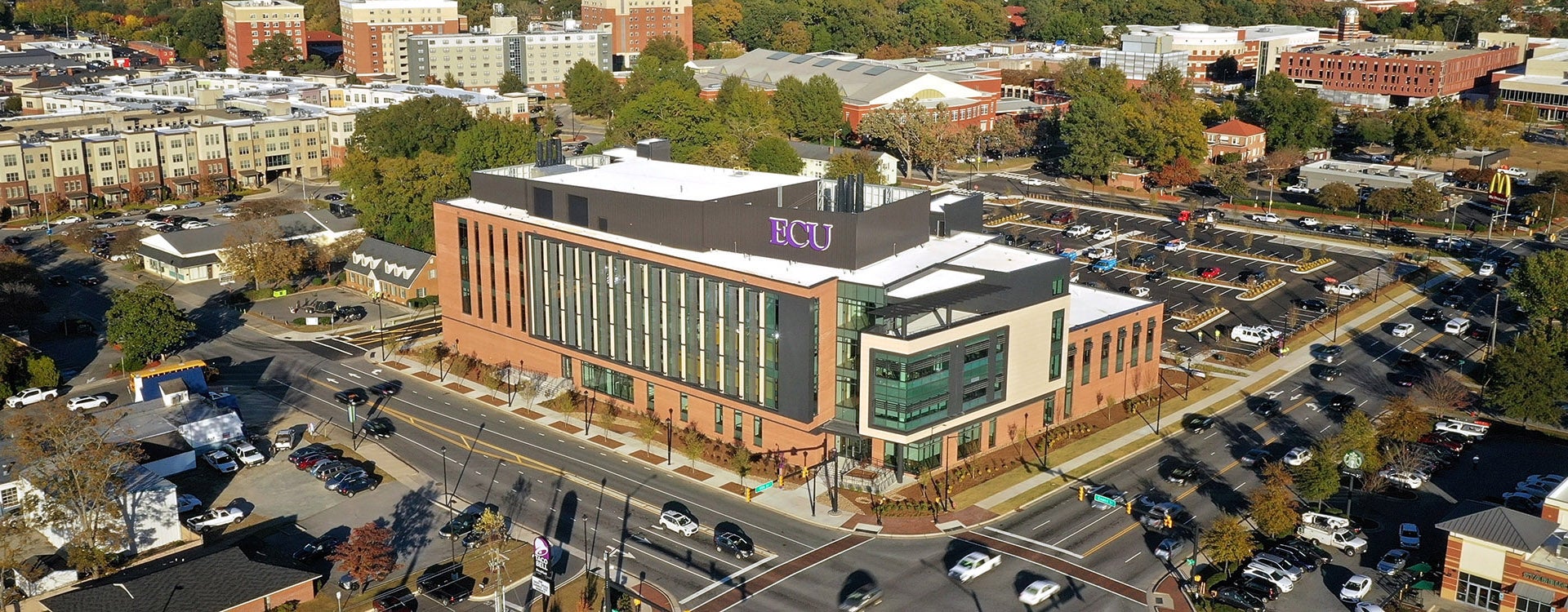ECU part of Build Back Better grant award
The North Carolina Biotechnology Center and a statewide coalition of public and private partner organizations and institutions that includes East Carolina University are a Phase 1 recipient of up to $500,000 in the U.S. Economic Development Administration’s $1 billion Build Back Better Regional Challenge.
The coalition proposes to create a national life science manufacturing resource while advancing production technology and addressing vulnerabilities in the region’s supply chain and manufacturing capacity that were highlighted during the coronavirus pandemic.

Dr. Loren Limberis, an associate professor in ECU’s Department of Engineering and the director of the Eastern Region Pharma Center, stands in one of the labs of the new Life Sciences and Biotechnology Building. He said the center will play an important role in promoting workforce development in the pharmaceutical industry as part of the Build Back Better grant award (Photo by Cliff Hollis)
The project will bring together four universities in a unique product development and manufacturing partnership; create training hubs in new areas by uniting existing efforts of community colleges and universities, including historically Black colleges and universities; proactively prepare sites suitable for life sciences facilities in distressed areas; and leverage current and planned community programs to support those transitioning to these jobs.
The Eastern Region Pharma Center (ERPC) in ECU’s new Life Sciences and Biotechnology Building will play an important role in the project, said Dr. Loren Limberis, an ECU engineering associate professor in the College of Engineering and Technology and the director of the center. The ERPC, now in development with funding from the Golden LEAF Foundation and ECU, is working with five regional community colleges and 15 pharmaceutical companies to promote workforce development to meet industry demand in the BioPharma Crescent, a five-county area that includes Pitt County and already has 10,000 life sciences manufacturing jobs.
The grant uses the ERPC framework and would expand its programming to additional counties and community colleges, providing an opportunity to educate students and train workers for high-paying jobs in the pharmaceutical industry.
Limberis also said the ERPC can support pharmaceutical companies with pilot scale manufacturing capabilities that emphasize future industry needs such as continuous biomanufacturing processes, single-use technologies, manufacturing of cell or gene therapeutics and implementation of Pharma 4.0 technology, which is adapting digital strategies to pharmaceutical manufacturing.
“We currently have bench scale biomanufacturing teaching labs in the new Life Sciences and Biotechnology Building at ECU, but we also have the space and infrastructure in the new building for a pilot scale teaching facility to support the needs of the industry,” Limberis said. “The funding will also help in the development of our teaching labs to fully support online and remote education as well. We envision hybrid student teams working together in the labs with some students physically working in the lab while their teammates contribute remotely. In conjunction with our regional community colleges, these remote teaching capabilities will allow us to reach students in their home communities and deliver accessible project-based and team-based biopharmaceutical manufacturing education.”
The NCBiotech-led consortium was one of only 60 chosen from a field of 529 applicants for Phase 1 funds that will be used to further develop proposals to implement a collection of three to eight distinct, but related, regional projects. The proposals needed to include coordination of industry and community partners and be aligned with a holistic vision to build and scale a strategic industry sector.
Phase 1 recipients advance to Phase 2 of the challenge, in which 20-30 projects will be selected to receive up to $100 million in American Rescue Plan funding.
The project is called “Accelerating Life Science Manufacturing to Create Economic Resilience and Promote Equity in Distressed North Carolina Communities.” It is designed to help expand, connect, scale and promote life sciences manufacturing to heighten the transformation of North Carolina’s economy and its communities.
The partners in the effort include North Carolina Central University and a collaborative of other HBCUs in the state; the N.C. Community College System and a network of its community colleges; First Flight Venture Center; some of the state’s leading life sciences research universities including ECU and the University of North Carolina Wilmington; and the N.C. Department of Commerce.
Life sciences includes biology, engineering, data science and humanities in which ideas converge to create transformative innovations that — as examples — can treat or cure diseases, improve crop resilience or develop healthier and sustainable food ingredients.
“We are delighted to be selected as a finalist to advance biomanufacturing in underserved communities of our state,” Bill Bullock, NCBiotech’s senior vice president for economic development and statewide operations, said in a statement. “Together with our partners, we can build upon one of North Carolina’s core clusters — life sciences manufacturing. The Build Back Better Challenge affords us an opportunity to do this, further bolstering our rural communities and statewide economy.”
Keith Wheeler, executive director of ECU’s Office of National Security and Industry Initiatives in the Division of Research, Economic Development and Engagement, said pharmaceutical manufacturing is the greatest workforce development opportunity in eastern North Carolina — “one that ECU must not miss.” That’s why the ERPC will increase the number of qualified people, both students and current employees, with key skills, knowledge and experience to meet the current and future needs of the pharmaceutical industry.
“In collaboration with Biopharma Crescent partners, the ERPC will develop and enhance opportunities for students and incumbent workers to learn in place so they may enter into, and advance within, high-skill, high-pay pharmaceutical industry careers while allowing them to stay in, and contribute to, their home communities — especially those in eastern North Carolina’s rural counties,” Wheeler said.

ECU’s new Life Sciences and Biotechnology Building will house the Eastern Region Pharma Center. (ECU photo)
Related
https://news.ecu.edu/2021/11/11/a-grand-opening/
https://news.ecu.edu/2021/02/08/boost-for-pharma-training/